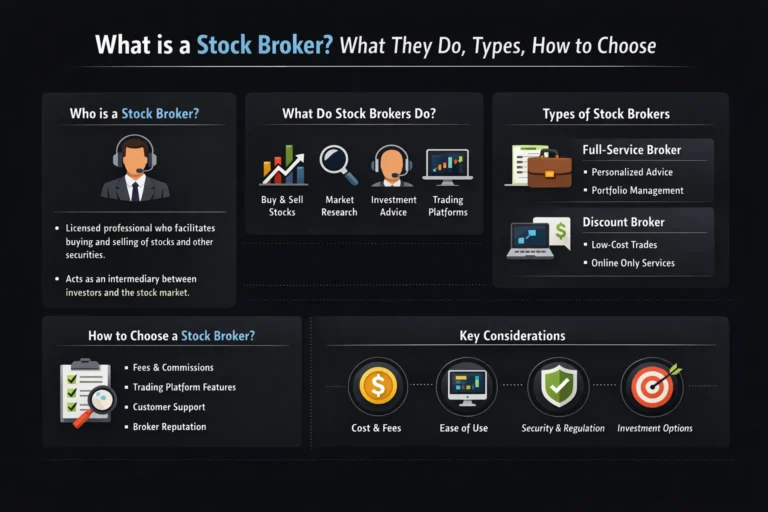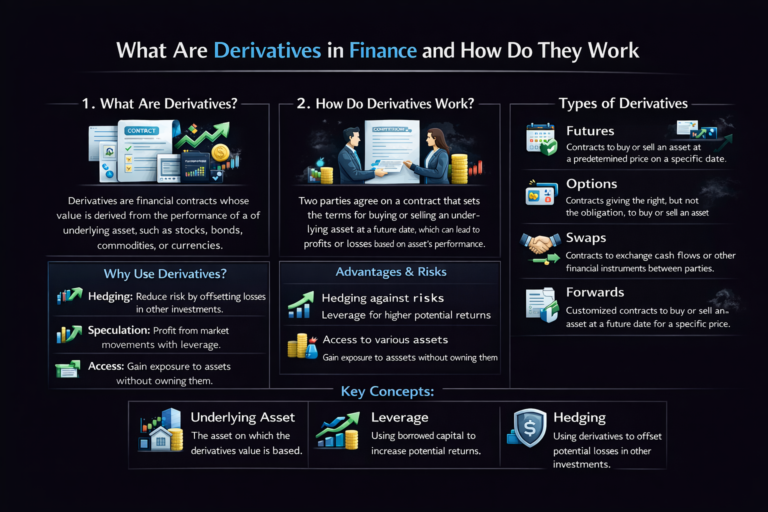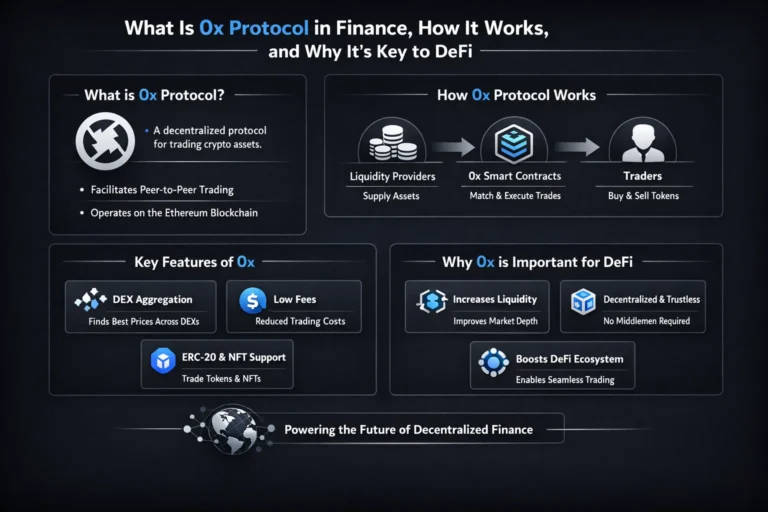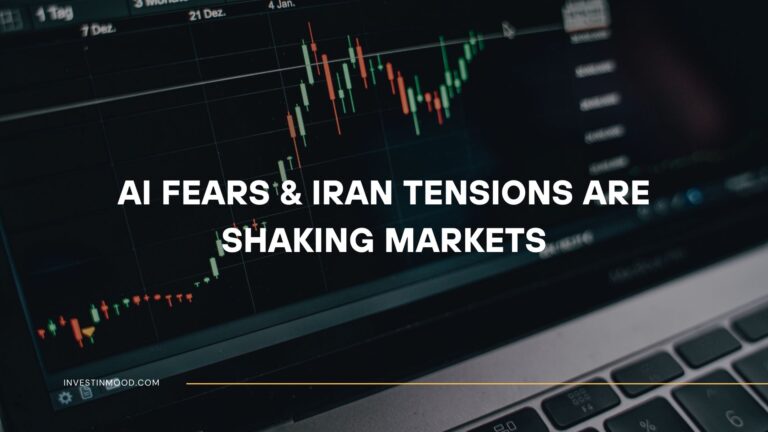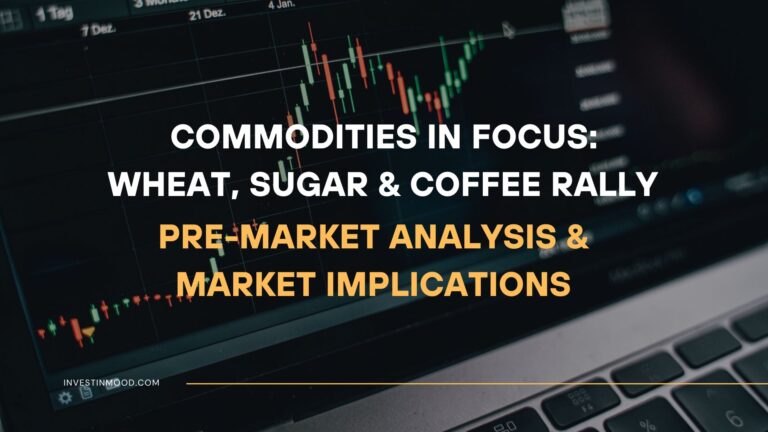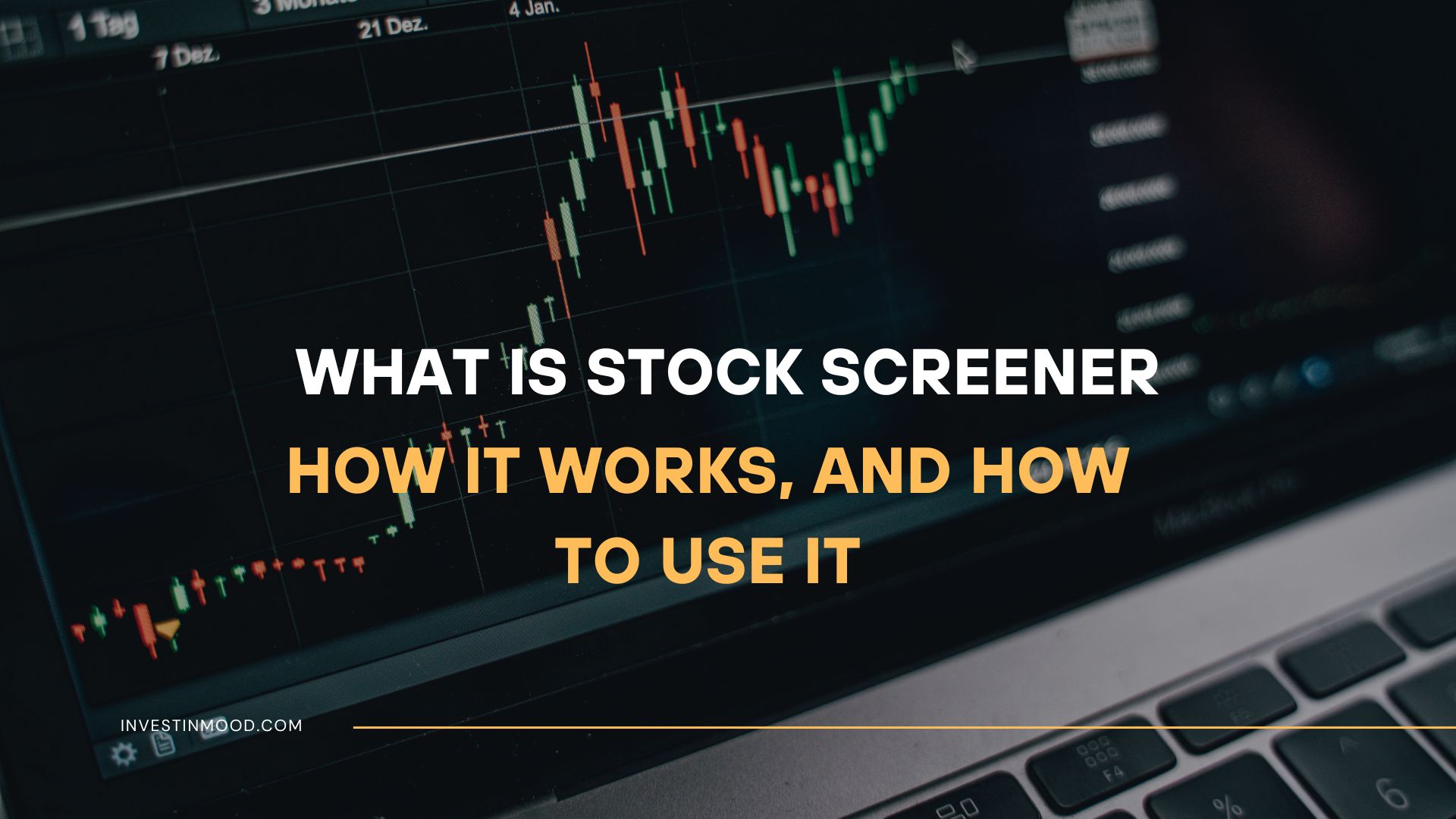
What Is Stock Screener, How It Works, and How to Use It
A stock screener is an indispensable digital tool for modern investors, acting as a search engine for the financial markets. It allows you to filter thousands of stocks based on specific, user-defined criteria to find potential investment opportunities that match your strategy. For active traders and long-term investors in the US, UK, Canada, and Australia, mastering a stock screener is the first step toward data-driven, disciplined investing on exchanges like the NYSE, NASDAQ, and LSE.
Summary Table
| Aspect | Detail |
|---|---|
| Definition | A software tool that allows investors to filter stocks based on a set of financial, technical, and fundamental criteria. |
| Also Known As | Equity Screener, Market Screener, Stock Filter |
| Main Used In | Stock Trading, Investment Research, Portfolio Management |
| Key Takeaway | It transforms overwhelming market data into a manageable list of potential investments, saving time and enforcing a disciplined, strategy-first approach. |
| Formula | N/A (It’s a filtering process, not a single calculation) |
| Related Concepts |
What is a Stock Screener
A stock screener is an application that sifts through a vast database of stocks—from thousands of companies listed on major exchanges—to find those that meet a specific set of investment criteria you define. Think of it as a high-powered search engine, like Google, but exclusively for stocks. Instead of searching for “best Italian restaurant near me,” you’re searching for “US technology stocks with a P/E ratio under 20, profit margin over 15%, and year-over-year revenue growth exceeding 10%.” The screener then delivers a curated list of stocks that pass all your filters, saving you from the impossible task of manually checking each company.
Key Takeaways
The Core Concept Explained
At its core, a stock screener works by applying Boolean logic (AND, OR) to financial data. When you set multiple filters, the screener uses an “AND” function by default, meaning a stock must meet all criteria to appear in your results. For instance, if you screen for “Market Cap > $10 Billion” AND “Dividend Yield > 3%”, you’ll only get large-cap, high-dividend stocks. A more advanced screener might let you use “OR” logic, such as “Sector = Technology OR Sector = Healthcare.” The power comes from combining dozens of data points—from valuation metrics and growth rates to technical indicators and analyst ratings—to pinpoint a highly specific type of company.
How to Use a Stock Screener
Using a stock screener is a systematic process that begins with defining your investment hypothesis. There is no single formula, but a powerful screening process follows a clear, repeatable framework.
The Step-by-Step Screening Framework
- Define Your Strategy: Are you a value investor, growth investor, or dividend seeker? Your strategy dictates your filters.
- Select Your Criteria: Based on your strategy, choose the relevant metrics. A value investor might look for low P/E and P/B ratios, while a growth investor focuses on high revenue and earnings growth rates.
- Set Your Parameters: Input the minimum, maximum, or exact values for your chosen criteria. Be realistic but strict.
- Run the Screen: Execute the search. The initial result list might still be large.
- Refine and Iterate: Add or adjust filters to narrow down the list to a manageable number (e.g., 10-20 stocks).
- Review and Research: This is the most critical step. The screener gives you a shortlist; you must now perform due diligence on each company, reading its financial reports, SEC filings, and news.
Example: Building a “Large-Cap Value” Screen
Let’s build a screen for a US-based large-cap value stock, using criteria relevant for investors in Tier-1 markets.
| Screening Step | Criteria | Parameter | Rationale |
|---|---|---|---|
| 1. Market & Size | Country | United States | Focuses on a specific, regulated market. |
| Market Capitalization | > $10 Billion | Ensures large, established companies (Large-Cap). | |
| 2. Valuation | Price-to-Earnings (P/E) Ratio | < 15 | Identifies stocks potentially trading for less than their earnings. |
| Price-to-Book (P/B) Ratio | < 1.5 | Looks for companies trading close to or below their asset value. | |
| 3. Financial Health | Debt-to-Equity Ratio | < 0.5 | Filters for companies with manageable levels of debt. |
| 4. Profitability | Return on Equity (ROE) | > 10% | Ensures the company is efficiently using shareholder equity. |
Running this screen on a platform like Yahoo Finance or Finviz would yield a list of companies like, perhaps, Pfizer (PFE) or Intel (INTC) at certain times, depending on market conditions. This is your starting point for deeper analysis.
Why Stock Screeners Matter to Traders and Investors
A stock screener is more than just a convenience; it’s a force multiplier for your investment process.
- For Investors: It brings discipline to portfolio construction. Instead of buying a stock because it’s in the news, you build a portfolio based on a repeatable, logical process. It helps in maintaining a diversified portfolio by easily screening across different sectors and market caps. For long-term investors in the UK and Australia, it can be invaluable for finding dividend aristocrats on the LSE or ASX that meet specific yield and payout ratio criteria.
- For Traders: It’s essential for identifying short-term opportunities. A swing trader can scan for stocks that have just broken out of a consolidation pattern on high volume. A day trader can find the most volatile stocks in the pre-market. It informs precise entry points based on quantitative data rather than gut feeling.
- For Analysts: It’s the first step in any equity research report. Analysts use screeners to generate a universe of comparable companies for valuation (a “comp set”) or to find the best-performing stocks in a particular industry for a thematic report.
How to Use a Stock Screener in Your Strategy
Here are specific, actionable screening strategies for different investor profiles.
Use Case 1: The Dividend Income Investor
- Goal: Find stable companies with a strong history of paying dividends.
- Sample Criteria:
- Dividend Yield: > 3%
- Payout Ratio: < 60% (Ensures the dividend is sustainable)
- Dividend Growth (5-Year): > 5% (Looks for growing dividends)
- Sector: Utilities, Consumer Staples, Healthcare (Traditionally stable sectors)
Use Case 2: The Growth Investor
- Goal: Identify companies with strong and accelerating revenue and earnings growth.
- Sample Criteria:
- Revenue Growth (YoY): > 15%
- EPS Growth (YoY): > 15%
- Return on Equity (ROE): > 15%
- Sector: Technology, Communication Services
Use Case 3: The Momentum Trader
- Goal: Find stocks that are trending strongly and have high trader interest.
- Sample Criteria:
- Price vs. 200-Day Moving Average: > 10% (Stock is above its long-term trend)
- Relative Strength Index (RSI): Between 40 and 70 (Strong but not overbought)
- Average Volume (30-Day): > 1 Million (Ensures liquidity)
To start building these screens, you need access to a robust screening tool. Many of the best online brokers in the US and UK, like Fidelity or Interactive Brokers, include powerful screeners in their platforms.
- Unparalleled Efficiency: Manually analyzing thousands of stocks is impossible. Screeners do it in seconds.
- Objective and Unemotional: They filter based on hard data, helping to overcome cognitive biases like confirmation bias.
- Discovery of Hidden Gems: They can uncover quality small or mid-cap stocks that receive little media coverage.
- Backtesting Capabilities: Advanced screeners allow you to test if your screening strategy would have worked in the past.
- Garbage In, Garbage Out (GIGO): If you use poor or illogical criteria, you will get poor results. The tool is only as smart as the user.
- Data Lag: Most free screeners use delayed or end-of-day data. Real-time data is often a premium feature.
- Lacks Qualitative Context: A screener can’t tell you about a company’s management quality, brand strength, or competitive moat.
- Over-Optimization Danger: It’s easy to create a screen so specific that it only returns stocks that performed perfectly in the past but may not in the future.
Stock Screener in the Real World: Finding “FAANG” Before They Were Giants
While stock screeners are great for finding today’s opportunities, their true power is evident in how they could have identified tomorrow’s winners years ago. Let’s consider the “FAANG” stocks (Meta/Facebook, Apple, Amazon, Netflix, Google) in their early days as public companies.
A growth-focused investor in, say, 2010 could have used a screener with criteria like:
- Market Cap: $5 Billion – $50 Billion ( sizable but with room to grow)
- Revenue Growth (YoY): > 25%
- Sector: Technology
Running this screen in 2010 would have likely returned a list including AAPL, AMZN, NFLX, and GOOGL. While this is a historical example with perfect hindsight, it illustrates the principle: screeners can systematically identify companies with powerful growth engines before they become household names and trillion-dollar behemoths on the NASDAQ.
Top 5 Free Stock Screeners for Investors in 2026
While many brokers offer built-in screeners, these standalone platforms are excellent for deep research.
- Finviz (Finance Visualizations): Known for its powerful heatmaps and extensive filterable criteria, even in its free version. The Elite paid version offers real-time data and more advanced features. Excellent for technical screening.
- Best For: Intermediate to advanced users who love data visualization.
- Geo-Targeting: Strong on US markets.
- Yahoo Finance Screener: A very user-friendly and free screener with a solid set of fundamental criteria. It’s a perfect starting point for beginners and integrates seamlessly with Yahoo’s news and charting tools.
- Best For: Beginners and casual investors.
- Geo-Targeting: Good for US, Canada, and other major global markets.
- TradingView Screener: Boasts a beautiful interface and a massive community. It excels at technical screening and allows you to easily switch between stocks, forex, and crypto. The free plan has some limitations but is very capable.
- Best For: Traders and chartists of all levels.
- Geo-Targeting: Global coverage.
- Zacks Premium Screener: While Zacks is known for its ranking system, its free screener is robust and allows you to filter by their proprietary metrics like Zacks Rank. A great tool for those who follow their investment philosophy.
- Best For: Investors who use or are curious about the Zacks Rank system.
- Geo-Targeting: Primarily US-focused.
- Google Finance: While more basic, it’s incredibly simple and integrated into the Google ecosystem. It’s useful for very quick, simple screens based on market cap, price, and exchange.
- Best For: Ultra-simple, quick checks.
- Geo-Targeting: Global.
Building a Screening Checklist: From Scan to Investment
A screener is just step one. Here is a post-screening checklist to ensure you make a sound decision.
Phase 1: The Initial Screen (The Screener’s Job)
- Define my investment strategy (Value, Growth, Dividend, etc.).
- Select and input 5-10 relevant quantitative criteria.
- Run the screen and refine until I have a watchlist of 10-30 stocks.
Phase 2: Deep Qualitative Research (Your Job)
- Read the Annual Report (10-K): Especially the Management Discussion & Analysis (MD&A) and risk factors.
- Analyze the Competitive Moat: What gives this company a durable advantage over rivals?
- Assess Management: Look at executive backgrounds and track records (e.g., ROIC under their leadership).
- Check the News & Sentiment: Are there any major pending lawsuits, regulatory issues, or negative press?
Phase 3: Final Valuation & Decision
- Perform a Valuation Check: Is the current price attractive relative to my estimate of intrinsic value? (Use DCF, comparable analysis, etc.).
- Decide on Position Size: How much of my portfolio should this stock represent based on its risk/return profile?
- Set Entry/Exit Rules: At what price will I buy? What is my stop-loss or sell target?
Stock Screeners vs Stock Simulator
A stock screener is a tool for applying other analytical concepts. Its value is derived from the quality of the criteria you input, which come from fields like fundamental and technical analysis.
| Feature | Stock Screener | Stock Simulator (Paper Trading) |
|---|---|---|
| Primary Purpose | To find and filter potential investment opportunities. | To test and practice trading strategies without real money. |
| What it Provides | A list of stocks that meet specific criteria. | A simulated trading environment with fake capital. |
| Key Benefit | Discovery and research efficiency. | Risk-free learning and strategy validation. |
| Stage of Use | The very beginning of the investment process (idea generation). | After you have an idea, but before you commit real capital. |
Conclusion
Ultimately, a stock screener is a foundational tool that bridges the gap between investment theory and practice. It empowers you to move from a passive recipient of financial news to an active, disciplined investor who hunts for opportunities based on a defined strategy. While it has limitations—primarily its reliance on quantitative data and the user’s skill—its benefits in efficiency, objectivity, and discovery are undeniable. By incorporating a stock screener into your regular research routine, you can systematically build a watchlist of high-potential stocks, making your investment process more informed and less emotional. Start by experimenting with a free screener on a site like Yahoo Finance or your brokerage platform to filter for just one or two criteria, and experience the power of focused research firsthand.
Ready to put these concepts into action? The right tools are essential. We recommend starting with a platform that offers a powerful, user-friendly screener. For a deep dive into the top options, see this external review of the best stock analysis software on the market.
Related Terms
- Fundamental Analysis: The art of evaluating a company’s intrinsic value based on its financial statements and health. A screener uses fundamental metrics like P/E ratio and ROE as its primary filters.
- Technical Analysis: The study of past market data, primarily price and volume, to forecast future price movements. Screeners can filter based on technical indicators like Moving Averages and RSI.
- Financial Ratios: The building blocks of any screener. These are the quantifiable metrics (P/E, Debt/Equity, etc.) used to compare companies.
- Portfolio Diversification: The strategy of spreading investments across various assets to reduce risk. A screener is crucial for finding non-correlated assets across different sectors, market caps, and geographies to build a diversified portfolio.
Frequently Asked Questions
Recommended Resources
- Investopedia: Stock Screener Definition - A great external reference for basic definitions.
- SEC.gov EDGAR Database - The ultimate source for fundamental data; use this to verify the numbers your screener finds.
- The Motley Fool: Guide to Stock Screeners - A beginner-friendly guide from a reputable source.
